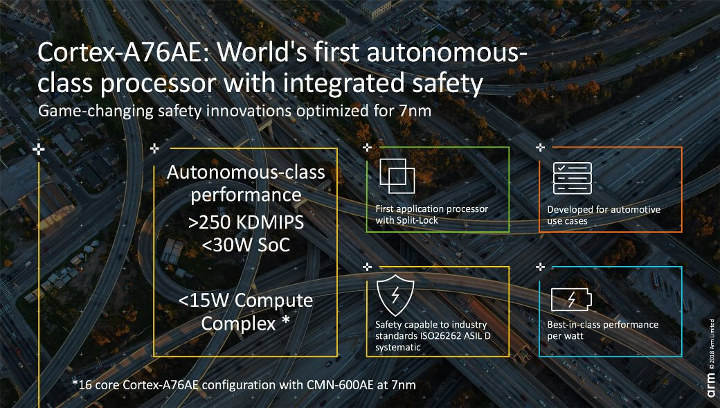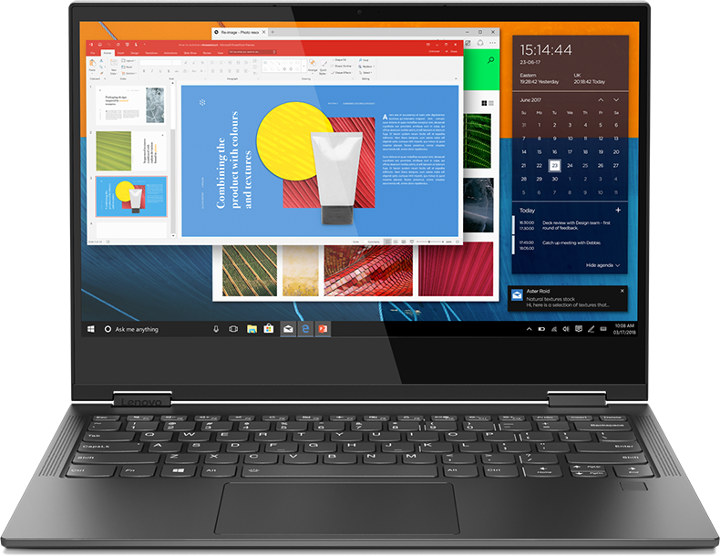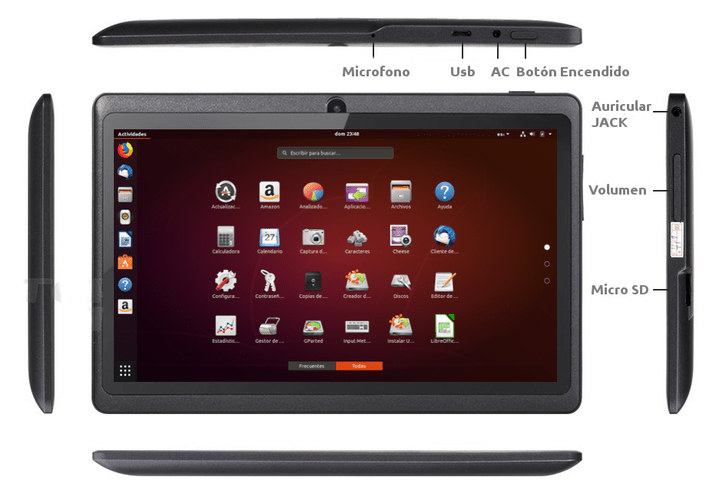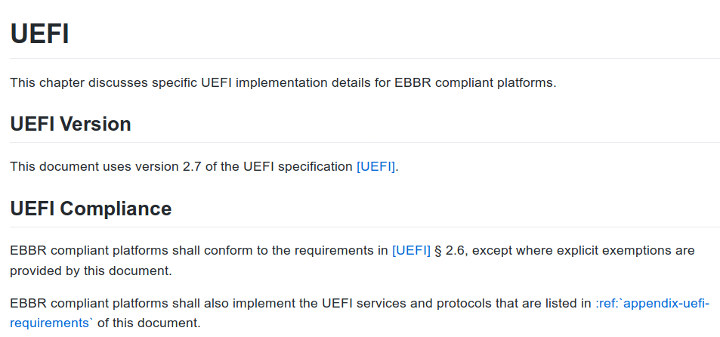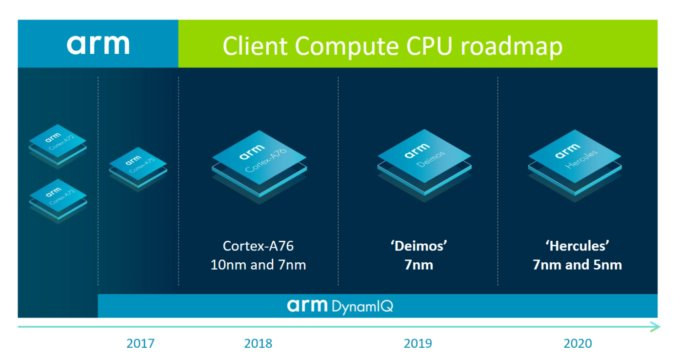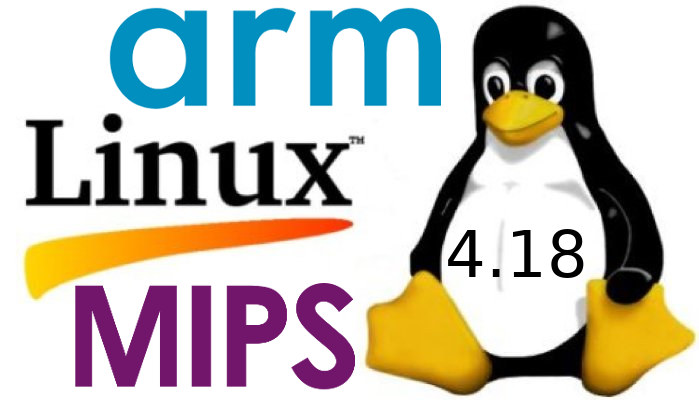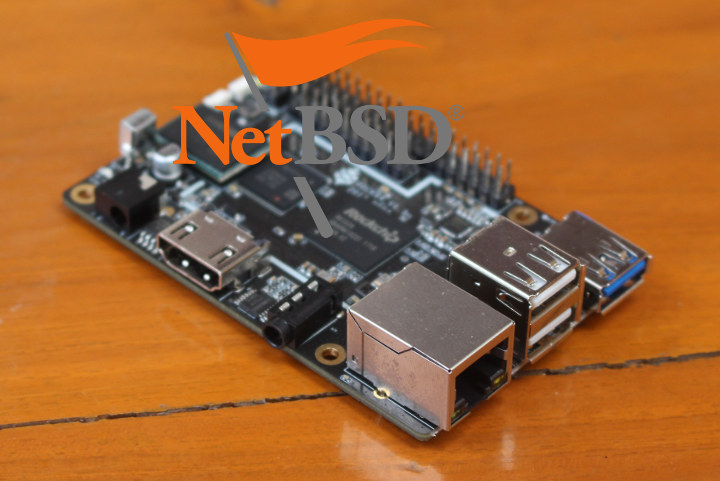Arm Cortex A76 processor core was first unveiled in June of this year, and very recently Hisilicon – part of Huawei – introduced Kirin 980 processor with four Cortex A76 cores, four Cortex A55 cores. Arm has now unveiled another variant of Cortex-A76 core. Cortex-A76AE (Automotive Enhanced) is designed for automotive application, and specifically autonomous driving applications, thanks to extra safety features such as Split-Lock capability which includes the ability for Dual Core Lock-Step (DCLS). The latter means that two processors are running the same code at the same time, and the instructions is only validated is the results are identical on both processors. Microarchitectural highlights of Cortex-A76AE for safety: Dual Core Lock-Step (DCLS) – The Cortex-A76AE is capable of running in Dual Core Lock-Step (DCLS), and hence is able to contribute towards a system’s ASIL D hardware diagnostic coverage requirements. Memory protection – The Cortex-A76AE supports Single Error Correction, […]
Lenovo Yoga C630 WOS Laptop Comes with Qualcomm Snapdragon 850 SoC, up to 8GB RAM & 256GB UFS Storage
The first Windows 10 based Arm laptops, also referred to as always-on always connected mobile PC’s, were launched last year with Qualcomm Snapdragon 835 processor, LTE connectivity and promises of 20+ hours of battery life. The laptops did deliver on the last two features, but most reviewers found the devices – such as HP Envy X2 or ASUS Novago TP370 – to be pretty sluggish considering the price you’d paid for them. But Qualcomm did not stand still and announced Snapdragon 850 processor in June, with 30% better system performance, nearly three times faster AI performance, faster LTE connectivity, and a battery life of over 25 hours. So we just had to wait for products announcements, and the first Snapdragon 850 laptop is Lenovo Yoga C630 WOS (Windows on Snapdragon) that comes with 4 or 8GB RAM, 128 or 256GB internal storage, and hopefully provides a smoother user experience, maybe […]
TableX Arm Linux Tablet Runs Armbian Ubuntu, To Launch for 89 Euros
If you want an Arm Linux laptop, you have already some choices with products such as Pine64 Pinebook, or Olimex TERES-I open source hardware laptop, but if instead you’d rather do without keyboard, and get an Arm Linux tablet, choices are much more limited, if any at all. Back in 2012, Allwinner A10 based PengPod 700 & 1000 tablets were available for the company has since folded, and this year, RasPad case launched to allow you to build your own thick tablet with a Raspberry Pi 3 (B+). However, if you want to normal looking tablet, your best option right now is to get an Android tablet and mess around to install Linux on it. That’s not for everyone, and the good news is that what looks like a proper – albeit low-end – Arm Linux tablet is coming to market soon with TableX. TableX preliminary hardware specifications: SoC – […]
Embedded Base Boot Requirements (EBBR) Project Aims to Standardize Booting on Embedded Systems
Desktop and server systems relies on standardized interfaces between the bootloader and the OS like UEFI and ACPI, but for embedded systems the way the bootloader, often U-boot, handles the boot flow may vary greatly between targets. Arm and its partners already worked on this in the server space with the Server Base Architecture Specification (SBSA) , and more specifically the Server Base Boot Requirements (SBBR) within the specification that requires the use of both UEFI and ACPI on servers. Arm has now done something similar with the Embedded Base Boot Requirements (EBBR) project that targets specifically embedded systems, is based on a subset of UEFI, and works with either ACPI or device tree. EBBR specification once implemented in bootloaders like U-boot or Tianocore/EDK2 should allow a single version of an OS image to boot on multiple platforms without the per-platform customization required today.. In practical terms it means the […]
Embedded Linux Conference Europe & OpenIoT Summit Europe 2018 Schedule
The Embedded Linux Conference & OpenIoT Summit 2018 took place in March of this year in the US, but the European version of the events are now planned to take place on October 21-24 in Edinburg, UK, and the schedule has already been released. So let’s make a virtual schedule to find out more about some of interesting subjects that are covered at the conferences. The conference and summit really only officially start on Monday 22, but there are a few talks on Sunday afternoon too. Sunday, October 21 13:30 – 15:15 – Tutorial: Introduction to Quantum Computing Using Qiskit – Ali Javadi-Abhari, IBM Qiskit is a comprehensive open-source tool for quantum computation. From simple demonstrations of quantum mechanical effects to complicated algorithms for solving problems in AI and chemistry, Qiskit allows users to build and run programs on quantum computers of today. Qiskit is built with modularity and extensibility […]
Arm Roadmap to 2020 Reveals Deimos and Hercules Processors for 5G Laptops
Arm has just published a roadmap for their Cortex-A processors until 2020, where we can see 7nm Deimos, and 7 to 5 nm Hercules succeeding Arm Cortex A76 core with “laptop class performance” announced last spring. For reference, an Arm Cortex A76 @ 3 GHz is said to outperform an Intel Core i5-7300U (15W TDP) processor at a lower power envelop. The two new Cortex-A cores will offer better better performance, will be launched in 2019 and 2020respectively, and as we’ll see below Arm expects those core to outperform Intel Core i5 processors. Current Arm laptop based on Qualcomm Snapdragon 835 have generally been disappointing in terms of performance, especially considering the prices those are sold for, but after a big jump on performance for Cortex A76 cores, Arm expects a 15% increase in compute performance per year. Hercules is expected to be around 2.5 times faster than current Arm […]
Linux 4.18 Release – Main Changes, Arm and MIPS Architecture
Linus Torvalds has just announced the release of Linux 4.18: One week late(r) and here we are – 4.18 is out there. It was a very calm week, and arguably I could just have released on schedule last week, but we did have some minor updates. Mostly networking, but some vfs race fixes (mentioned in the rc8 announment as “pending”) and a couple of driver fixes (scsi, networking, i2c). Some other minor random things (arm crypto fix, parisc memory ordering fix). Shortlog appended for the (few) details. Some of these I was almost ready to just delay to until the next merge window, but they were marked for stable anyway, so it would just have caused more backporting. The vfs fixes are for old races that are really hard to hit (which is obviously why they are old and weren’t noticed earlier). Some of them _have_ been seen in real […]
NetBSD ARM64 Images Now Available with SMP for Raspberry Pi 3, Some NanoPi Boards, and Pine64 Boards
NetBSD on Arm started in 2014 with the release of version 7.0, and last year device tree support was implemented and tested on some Allwinner H3 boards. But apparently, so far NetBSD only supported 32-bit Arm, with initial support for 64-bit Arm (ARM64) committed last April, but good progress has been made, and NetBSD ARM64 bootable firmware images are now available with SMP (multi-core) support. Eight different NetBSD ARM64 images can be downloaded: Generic NetBSD 64-bit image for Raspberry Pi 3 and NVIDIA Tegra X1 Two images for FriendlyELEC boards namely NanoPi NEO2 and NEO Plus2 boards Five images for the following Pine64 boards and hardware platforms Pine A64/A64+ Pine A64-LTS / Sopine with baseboard Pine H64 Pinebook laptop ROCK64 (ROCK64Pro not yet supported) The supported hardware matrix shows most features are supported, but there are still a few things missing such as GPU, crypto and MIPI CSI on all […]


